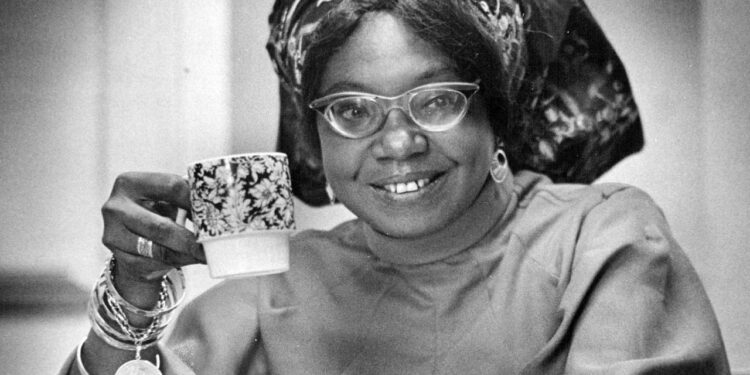Flora Nwapa, born Florence Nwanzuruahu Nkiru Nwapa in 1931 in Oguta, southeastern Nigeria, was a pioneer and icon of “feminist” expression in African literature. Her influence extended beyond Nigeria, becoming a global voice reflecting the experiences of African women in a rapidly changing society and challenging the stereotypes often imposed by male writers. Through her novels, short stories, and poetry, Nwapa weaves vivid portraits of everyday life, exploring themes such as motherhood, marriage, economic independence, education, and the clash between tradition and modernity, offering an authentic and culturally rich female perspective.
Flora Nwapa grew up in an environment that blended rich tradition and modern education. Her father, Christopher Nwapa, was an agent of the United Africa Company, while her mother, Martha Nwanzuruye, was a teacher. This dual background of openness to the outside world and adherence to local roots shaped her later literary personality. She was educated in missionary schools, which were not widely available to girls at her time, reflecting the importance her family placed on female education.
Nwapa studied at the prestigious University College (now University of Ibadan), Ibadan, in Nigeria, where she obtained a Bachelor of Arts degree in 1957. She then continued her education at the University of Edinburgh in Scotland, obtaining a Diploma in Education in 1958. Her years in Edinburgh were a crucial period in her intellectual formation, as she was exposed to a wide range of literary and critical ideas and honed her linguistic skills. This strong academic background, combined with her personal experience as an Igbo girl and woman, provided her with the tools to embody her unique literary vision.
After returning to Nigeria, Flora Nwapa engaged in the fields of education and administration. She worked as a teacher at Queen’s College in Enugu and later at the University of Lagos as an administrative registrar. These diverse experiences, in both teaching and administration, gave her a deep understanding of Nigerian society and the challenges faced by individuals, especially women, in education and employment. These observations and experiences served as the raw material that would later form the fabric of her literary works.
In 1966, Flora Nwapa’s first novel, Efuru, was published to great acclaim. Efuru was not just a novel; it marked a milestone in the history of African literature written in English, as it was considered the first novel published by an African woman in Britain. This achievement was not only symbolic; it opened the door for generations of African women writers to tell their stories.
Efuru revolves around a strong and stubborn woman, Efuru, who experiences multiple trials and tribulations of marriage, motherhood, and loss. Contrary to the stereotype of a weak or subordinate woman, Nwapa presents Eforo as an intellectually and economically independent woman striving to achieve self-fulfillment in a society that imposes certain restrictions on women’s roles. The novel explores motherhood in depth, as Eforo struggles with childbearing, a significant challenge in a society where motherhood is highly valued. However, Nwapa doesn’t simply portray her as a victim; rather, she portrays her as a woman who finds other ways to achieve self-sufficiency, whether through trade or adoption.
Nwapa uses vivid and vibrant language in Eforo, replete with Igbo proverbs and cultural references, giving the novel an authentic and profound feel. She demonstrates a unique ability to integrate African oral traditions into written narratives, making her work rich and multilayered. The novel is not just a single story; it is a mirror that reflects the social and economic transformations in post-colonial Nigeria and the impact these transformations have had on women’s lives.
Flora Nwapa continued to explore themes of motherhood, marriage, economic independence, and education in her later works. In her second novel, Idu (1970), Nwapa delves into the theme of loss and grief, depicting women’s responses to these challenges. She also highlights the value of hard work and self-reliance in a society where women strive for status.
Nwapa was particularly interested in portraying working women, whether as traders, farmers, or teachers. She showed how women were not simply homemakers but key economic actors in their communities, contributing significantly to the well-being of their families and communities. In doing so, she challenged the stereotype of the submissive and dependent African woman, presenting a more complex and powerful image.
She also addressed the conflict between tradition and modernity. Her female characters often faced difficult choices between adhering to old customs and looking forward to a more modern future. Nwapa was not advocating the rejection of tradition, but rather a critical reflection on its aspects and how women could navigate both worlds without losing their identity. In her 1975 novel, Never Again, Nwapa examined the Nigerian Civil War (the Biafran War) from a female perspective, highlighting the suffering and challenges women faced during this turbulent period and how they were able to persevere and survive.
In addition to her literary career as a writer, Flora Nwapa played another pioneering role in the African cultural scene. In 1977, she founded her own publishing house, Tana Press, becoming the first African woman to establish a publishing house. This venture was revolutionary for its time, reflecting her vision to empower African voices, especially women’s voices, in a publishing world that was largely dominated by the West.
Tana Press was more than just a publishing house; it was a platform for new talent, a space for the exchange of ideas, and a means to promote education and culture in Nigeria. Through it, Nwapa published her own works, as well as works by other African writers and children’s books. Her goal was to provide culturally relevant books, written from an African perspective, for an African audience. Tana Press faced many challenges, including economic and political ones, but Nwapa remained committed to her vision until her death. This achievement underscores her profound belief in the importance of African narratives and the importance of Africans owning their own stories.



























































